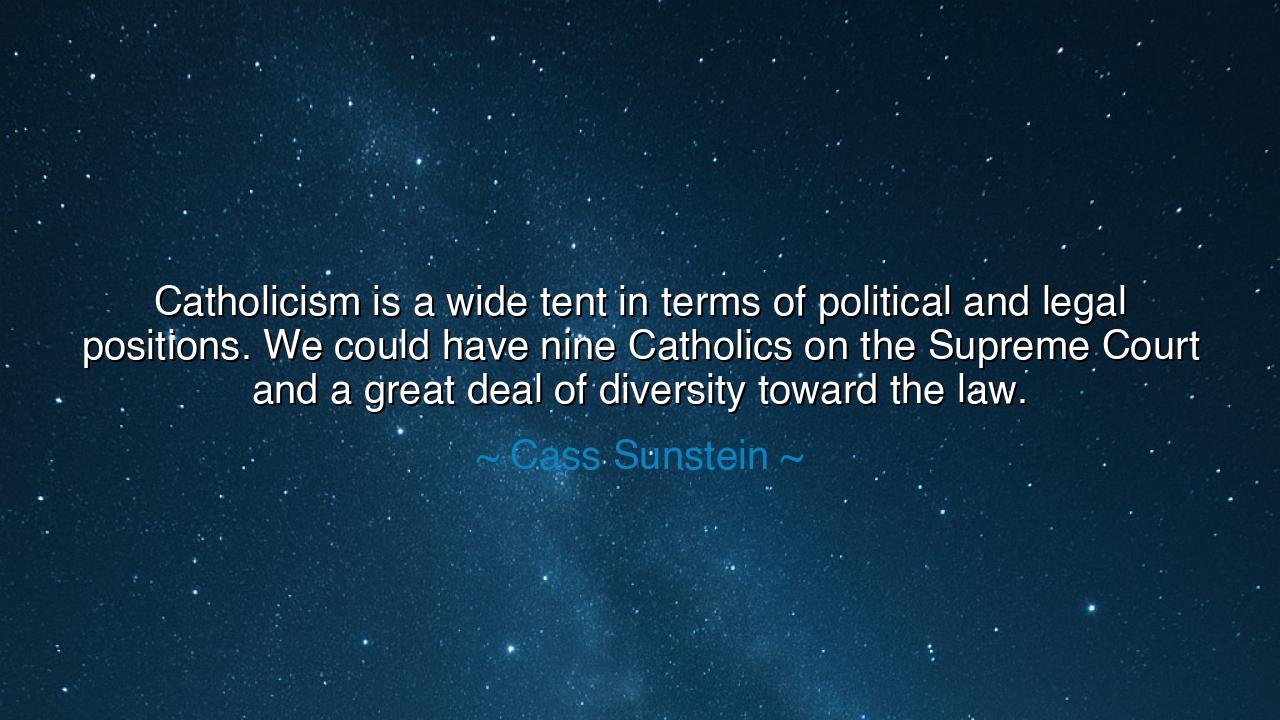
Catholicism is a wide tent in terms of political and legal
Catholicism is a wide tent in terms of political and legal positions. We could have nine Catholics on the Supreme Court and a great deal of diversity toward the law.






Hear the thoughtful words of Cass Sunstein, who, reflecting upon faith and law, declared: “Catholicism is a wide tent in terms of political and legal positions. We could have nine Catholics on the Supreme Court and a great deal of diversity toward the law.” In this saying, he cuts through shallow assumptions and reveals a truth often forgotten: that a shared faith does not mean a shared mind, and that the breadth of human conviction cannot be confined by a single identity.
At the heart of his words lies the idea of the wide tent. Catholicism, stretching across centuries and continents, embraces within it monks and kings, laborers and scholars, conservatives and reformers. Its teachings form a foundation of belief, yet within that foundation stand countless interpretations, priorities, and visions for justice. Thus, Sunstein warns against the presumption that identity dictates ideology. Even if the highest court in the land were filled with members of one faith, the diversity of their judgments could still be profound.
History bears witness to this truth. Consider Justices Antonin Scalia and Sonia Sotomayor—both Catholics, yet standing on opposite poles in their judicial philosophy. Scalia, with his fervent originalism, sought to anchor law in the unchanging words of the Constitution, while Sotomayor, with her empathy and pragmatism, sought to interpret law through the living realities of society. Their shared faith did not bind them to shared conclusions, for the law is a mirror of the mind, not a cage of the soul.
The wisdom of Sunstein’s saying is that identity is never destiny. Too often, societies fall into the trap of believing that if they know one’s race, religion, or heritage, they know their heart. Yet the human spirit is vast, and from the same tradition can spring both radicals and conservatives, both guardians of tradition and champions of change. Catholicism itself has nurtured both liberation theologians who fought for the poor in Latin America and defenders of hierarchy who resisted reform. It is a tent wide enough to house contradiction, and through that contradiction, richness.
There is also here a defense of the plurality of thought that makes justice possible. For a court of nine identical voices, no matter their faith, would be a court of poverty. But a court of nine voices shaped by different philosophies, even within the same religious tradition, is a court of vitality. Sunstein’s words remind us that diversity is not only of background, but of reasoning, of conscience, of the paths by which individuals seek truth.
The lesson for us, then, is to never reduce a person to a single label. When you meet another, do not assume their faith, their gender, or their heritage dictates their views. Look instead to the content of their reasoning, the compass of their conscience, and the courage of their decisions. True justice and true community are built not by sameness of identity, but by the respectful clash and harmony of diverse minds.
Therefore, children of tomorrow, take this teaching to heart: diversity is deeper than appearances, richer than labels, and broader than identity. Do not fear if institutions are filled with those of a single background, for within each person lies a multitude of experiences and choices. Judge not by the surface, but by the substance. And let Sunstein’s words remind you that even beneath the same tent, there can be many stars, each shining with its own light, guiding the world toward a fuller understanding of law, justice, and truth.






AAdministratorAdministrator
Welcome, honored guests. Please leave a comment, we will respond soon